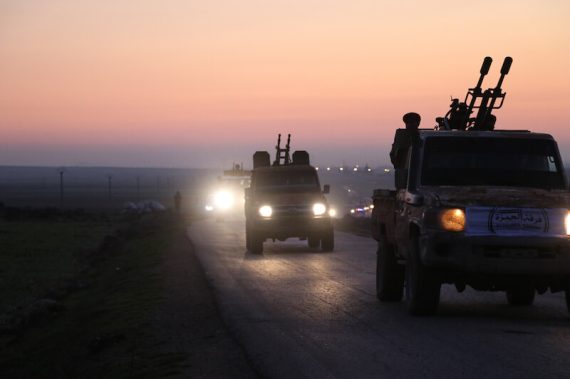U.S. President Trump has once again rocked the world agenda with his tweets. He declared that he will withdraw the American troops in Syria. The order to withdraw U.S. forces from Syria was signed shortly after. According to American news sources, the order will start the withdrawal of 2600 American servicemen in Syria; it is “expected to begin in the next several weeks and could take several weeks to finish.”
President Trump’s decision led to severe repercussions in the American state apparatus as Secretary of Defense James Mattis quit and the top U.S. envoy leading the international coalition fighting Deash, Brett McGurk resigned. General Joseph Votel of CENTCOM has also made it clear how upset they are because of this decision. All this shows that Trump took this decision not only independent of this bureaucratic apparatus and some of his own men but also against them.
For so long, the circle around Trump tried hard to persuade him that the PYD is the only partner that they can work with on the ground. Despite Turkey’s persistent calls and warnings with regard to the PYD terrorism against Turkey, the U.S. has so far walked with the PYD. But it seems like those days are over now. Turkey’s President Erdogan has persuaded Trump to leave working with the PYD in Syria in a phone call. The unexpected part was that Trump decided not only to leave the PYD but the country altogether, which was a surprise to everybody. Nobody was ready to this new situation and it will be a whole new challenge. What might happen next then?
Despite Turkey’s persistent calls and warnings with regard to the PYD terrorism against Turkey, the U.S. has so far walked with the PYD. But it seems like those days are over now.
Assuming that the U.S. will pull out, this leaves us with a territory composing more than a quarter of Syria’s land mass. This huge mass of land will attract the interests of many global, regional, and local actors. Of course, the timing and style of the American withdrawal will limit the options but in any way, the land mass is too big not to catch some interested eyes. The first thing to know about this new vacuum is that is it too big not to catch such an attention but again, it is also too big to be controlled by a single actor alone.
Recommended
As for Turkey, it would prioritize to clean its immediate neighborhood from the PYD. For this reason, Turkey might start its cleaning with Manbij in the west of the Euphrates and go on along its border toward the east. But with regard to the further south toward Raqqa and Deir ez-Zor, it might be quite a bit of stretch for Turkey and its local partners to control all alone. I believe Turkey will be open to negotiate with other involved powers in the control of these southern territories and in the fight against DEASH.
Assuming that the U.S. will pull out, this leaves us with a territory composing more than a quarter of Syria’s land mass. This huge mass of land will attract the interests of many global, regional, and local actors.
European powers, Iran, and Russia all have already shown or will show interest in this landmass but it seems like it will be Russia that Turkey and its local partners will have to deal with. Iran will not make a good partner in the East of the Euphrates as its involvement will also produce the need to counterbalance from Israel and Saudi Arabia, which will bring further trouble to the already suffering Syria.
European powers, on the other hand, are too weak on the ground to have a say in the bargain. This leaves Russia as the most prominent actor in the future of the area for Turkey. This is not too bad for Turkey given the coordination level the two countries reached in Syria is impressive. The Astana process did not resolve the Syria case so far but achieved to prevent the war to escalate. The two countries share this goal of ending the war and further to keep the territorial integrity of Syria intact.
Hence, it is not too hard to imagine that Turkey and Russia can cut a deal for the east of the Euphrates as well. Further, if the U.S., one way or another, wants to dictate the terms of filling in the vacuum it will leave, Turkey again can play its hand to find a middle ground with the U.S. It seems like Turkey has learnt how not to lose the diplomacy game with great powers in the Syria theatre.





